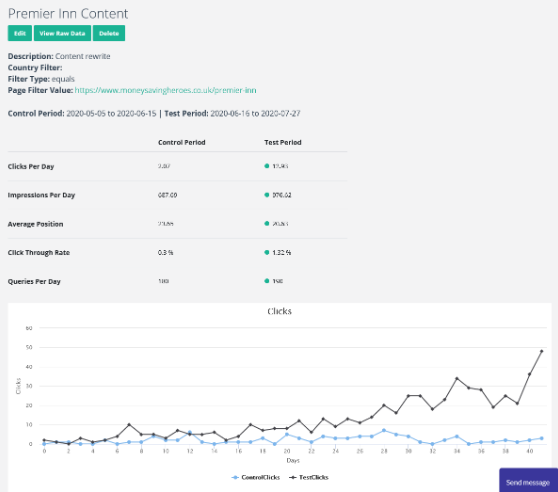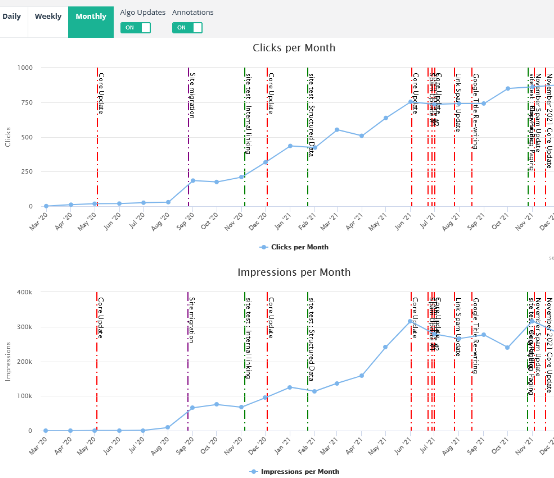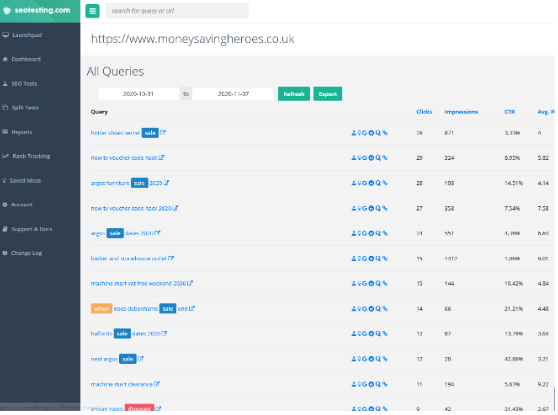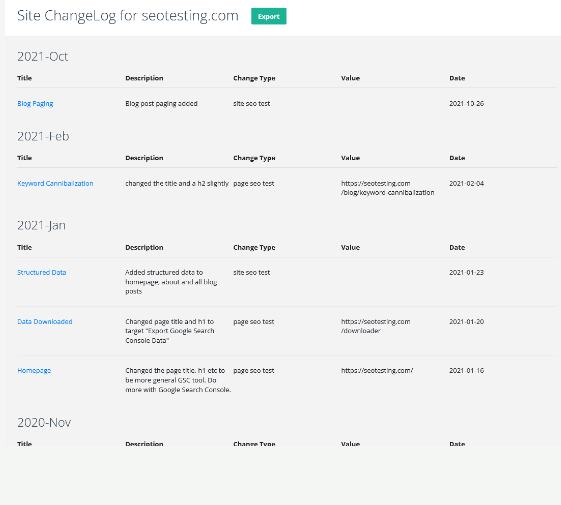Seotesting
Today we will be making a recommendation about SEOTesting, a tool designed to help you monitor and improve your website’s SEO performance. It lets you run SEO tests, track the performance of altered pages, and link your work to results precisely and significantly.
SEOTesting is designed with the user in mind, offering an intuitive interface that makes navigating through its various features straightforward. Users can easily set up tests, view results in a digestible format, and access insights that guide further optimization efforts. Its dashboard provides a clear overview of ongoing tests and performance metrics, making it accessible to both seasoned SEO professionals and newcomers to the field.
See some of the best features below:
SEOTesting Time Based SEO test

Time-based testing is essential for measuring the impact of changes on your website’s organic search performance over a specific period. It allows you to make informed decisions based on the performance data before and after implementing changes. SEOTesting provides three primary types of time-based tests:
1. Single URL or Query Tests
These tests are designed to analyze the performance of individual pages or specific search queries. By focusing on a single URL or query, you can understand how minor tweaks to content, meta tags, or other elements affect your page’s visibility and ranking in search engine results. It’s particularly useful for optimizing high-value pages or addressing specific keywords that are underperforming.
2. Group Tests
Group tests enable you to evaluate the collective impact of changes across multiple pages or categories. This type of test is ideal for assessing site-wide updates, such as redesigns, changes in site architecture, or updates to meta-information across a range of pages. By aggregating data from multiple URLs, you can gauge the overall effectiveness of broad SEO strategies and ensure that updates contribute positively to your site’s search performance.
3. URL Switch Tests
URL switch tests are useful when you’re transitioning content from one URL to another or when consolidating pages. This test helps you monitor the shift in search performance from the original URL to the new one, ensuring that the transition does not negatively affect your site’s SEO. It’s critical for maintaining or improving your search rankings during site restructures or when updating old content to new, more relevant pages.
SEOTesting Dashboards

SEOTesting enhances its utility with intuitive dashboards that serve as a powerful analytical tool for anyone looking to deep dive into their SEO performance. These dashboards are designed to distill complex Google Search Console data into more manageable and understandable weekly and monthly trends. This feature is particularly useful for SEO professionals and website owners who need to keep a pulse on their site’s search performance over time, enabling them to make informed decisions quickly. Let’s delve deeper into how these dashboards add value:
Weekly and Monthly Trends
The ability to visualize data trends over specific time frames is invaluable in the SEO world. By breaking down Google Search Console data into weekly and monthly insights, SEOTesting dashboards allow users to quickly identify patterns, anomalies, or shifts in their website’s search performance. This temporal granularity helps in pinpointing exactly when changes occurred, which is crucial for correlating these changes with specific SEO actions or external factors.
Tracking Confirmed Google Algorithm Updates
One of the standout features of the SEOTesting dashboards is the marking of confirmed Google Algorithm updates directly on the graphs. This functionality is a game-changer for SEO practitioners, as it allows them to visually correlate their website’s performance metrics with specific updates. Understanding the impact of these updates is critical for adapting SEO strategies in a timely manner.
Immediate Impact Analysis: When Google rolls out an algorithm update, it can have a significant impact on a website’s search rankings. By marking these updates on the dashboard graphs, users can immediately assess the impact on their site’s performance. This quick analysis is essential for deciding whether to continue with current strategies or to pivot in response to the changes.
Historical Reference: Over time, these marks provide a historical reference that can help in understanding long-term trends and the impact of successive updates on a site’s SEO performance. This can be instrumental in developing strategies that are resilient to future updates.
SEOTesting Reports based on Google console

SEOTesting leverages Google Search Console data to generate insightful reports that can significantly enhance your website’s SEO strategy. These reports are designed to identify opportunities for optimization, track new content performance, and avoid common pitfalls like keyword cannibalization. Let’s explore some of the key reports and features SEOTesting.com offers based on Google Search Console data:
Page Title and Meta Description Optimizations
Opportunities for Optimization: By analyzing click-through rates (CTR) from organic search results, SEOTesting identifies pages where improving the title and meta description could potentially increase traffic. This is crucial because compelling titles and descriptions can significantly impact a user’s decision to click on your link.
Top Query Missing and Top Query Per Page Reports: These reports highlight which important queries your page titles and meta descriptions might be missing, as well as the performance of pages based on their top queries. This data can guide you in refining your meta tags to better match user search intent, potentially boosting your site’s visibility and CTR.
Content-Based Reports
For New Articles and Content Expansion: Content-based reports offer insights into how new articles perform and identify opportunities for expanding existing content to better meet user needs. This can help in planning content strategies that align with search trends and user interests.
Search Intent Highlighting: Understanding the intent behind specific queries is essential for creating content that meets users’ needs. SEOTesting.com helps by highlighting the search intent, enabling you to craft content that is more likely to rank well and satisfy users.
New Keyword and New Page Reports and Alerts
- Stay Updated on Your Site’s Performance: These reports and alerts keep you informed about new keywords and pages that are performing well or emerging as opportunities. Staying updated allows for timely optimizations and capitalizing on new trends.
SEOTesting Changelog

The changelog feature in SEOTesting introduces a highly customizable and insightful way to annotate your Google Search Console data, elevating its utility for SEO analysis and client reporting. This feature is particularly beneficial for marking significant events, changes, or updates at various levels of granularity, including the entire site, specific pages, or even individual queries. Let’s delve into how this feature enhances your SEO toolkit:
Custom Graph Annotations
Granular Insights: By allowing annotations at the site, page, or query level, SEOTesting provides users with the flexibility to pinpoint exactly where and when changes occur. This granularity is crucial for understanding the impact of specific actions on your website’s SEO performance.
Visual Tracking: Annotations on graphs make it visually intuitive to track the correlation between implemented changes and shifts in search performance metrics. This visual representation helps in quickly identifying patterns or anomalies that may warrant further investigation or action.
Remembering Site Changes
Historical Reference: Keeping a record of all changes made to a website is essential for diagnosing issues, understanding the outcomes of various strategies, and planning future SEO actions. The changelog feature serves as a historical document, recording all significant modifications that could affect search performance.
Cause and Effect Analysis: By marking the dates of specific changes, such as updates to content, structure, or SEO strategies, users can more easily attribute fluctuations in performance to these actions. This cause-and-effect analysis is invaluable for refining SEO tactics.
To subscribe to SEOTesting just click the link below.






